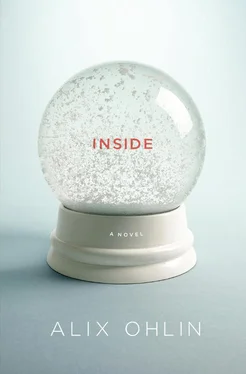
New York, 2002
SHE WAS NEW to the city at a time when having been there before meant something. She was late to the event. She didn’t know anyone, hadn’t lost anyone, wasn’t part of the history. This was all okay with her.
It was January. She found an apartment on the Lower East Side through a guy she met in her acting class. Larry’s grandmother had lived in the apartment for decades, keeping the rent low; now she was in a nursing home, adrift in an Alzheimer’s haze, only occasionally convinced she would soon move back home. The family, having cleared the apartment of its doilied furniture and ancient knickknacks, sublet it to Anne at what even she, new to New York, could tell was an insane bargain. This was because Larry hoped to have sex with her. She took the apartment and dropped the class.
Sometimes he came by, supposedly to pick up his grandmother’s mail or check on the faucets. “I never see you anymore,” he’d say, barely dampening the complaint in his voice.
“I’m so busy,” she’d say, never specifying at what.
Larry worked in commercials. He was the husband strolling through the house in the real-estate ad, the man grimacing with hemorrhoid pain before exhaling in relief. In between these shoots he took classes and auditioned for plays. “Keeping busy’s important,” he told Anne. “An unstructured life is a terrible thing.”
She politely agreed, then left as soon as possible, abandoning him in her apartment. She knew he wouldn’t disturb anything or rifle through her things — he was a transparently honest person, which was one reason he wasn’t a very successful actor — and also that he wouldn’t find anything of interest if he did.
She was not, in fact, busy at all. If her life was unstructured, at least it was terrible in ways she enjoyed. She had saved enough money to tide her over while she looked for work, and she believed that something perfect would come along — without knowing what it might be — and that before it did she shouldn’t accept substitutes. Her confidence in the universe’s generosity was mystical, and no less strong for not having been confirmed. She spent her days in coffee shops on Houston Street, reading Stanislavsky and scanning ads for casting calls. People at auditions kept shaking their heads and saying, “This part isn’t right for you, but trust me, it’s only a matter of time,” and she believed them. She heard the phrase so often that she came to see a matter of time as a literal, physical thing she could wrap around herself like a blanket, comforting and soft.
Finally she took a job at a temp agency in Midtown, mostly because she thought waitressing was a cliché. She did data entry in the off-hours, leaving the days free for auditions. In the waiting areas she always saw the same people, who became the closest thing to friends she had, although she knew they really weren’t, that they would resent anyone who broke through. She was cast as a fairy in a Midsummer that, being post 9/11, obliged her to wear a turban and carry a hand grenade. Even though the production was awful, she felt the lights on her face and knew the audience in the darkness was watching her, and her blood boiled like a kettle, dying to be poured.
The play closed after ten days, and her nights were free. Larry had stopped coming around. One evening she saw him inside a bar on Avenue A, holding hands with a woman across a tiny table, his eyes glassy with triumph. She didn’t care about him, of course, but a physical ache rippled across her skin. She went to a poetry reading that night at the New School. The reader was middle-aged and Irish, with ghostly, blue-green eyes. Each poem concerned the dissolution of his marriage and his resulting loss of faith in the world, which he thought had already been lost. This was the worst part, his poems seemed to say: you believed your cynicism would save you from hurt, only to discover a secret, uncherished vulnerability in your soul. Anne sat in the front row, bought his book afterward, and told him that his work spoke to her as little else did. “You’ve made me feel less alone,” she said.
They went out for a drink. The poet was rambling, sweet, and tender, and wept while describing his mother, who had died when he was a child. He didn’t ask Anne any questions about her life, but she didn’t mind. Acting was about listening, one of her teachers had told her: you focused on the other person in the scene and let them dictate to you. You reacted. Even more than that, you let them change you. So there was no need to decide in advance how to say your line. It was all response. This is what she did that night; by listening, she became — or pretended to become — the only woman in the world who understood him. Two days’ growth of salt-and-pepper beard grazed her cheek when they kissed; on his breath was the sour smell of red wine. At her apartment, he lay in bed and ranted about the man who was fucking his wife. The next morning he apologized if he’d talked too much.
“Not at all,” she said. “It was exactly what I needed.” What she needed was the bruise and crash of another body against her own, a collision that made her feel real. She’d wanted to be manhandled, not listened to, or cared for, or even seen.
“You pretty women are such goddamn nightmares,” a drunk told her one night in a dim bar on Fiftieth Street, where she’d stopped by after a day of temping. She had let him buy her a drink, then turned him down for dinner because she didn’t like the smell of his cologne, and now he was mad. “You’re all the same. Hollow at the core.”
“I’m not hollow,” she said, smiling sweetly. Her core was molten, radioactive. She knew that beneath the surface she was diseased, rotten, incinerating herself from the inside. But that wasn’t the same thing as being hollow. Not the same thing at all.
Toward the end of February, she got back to her building around six in the afternoon. She had been cast, through the intervention of the Irish poet, in a play about the potato famine. In rehearsals she had to roll around moaning in hunger in a chilly basement, and after every session she was exhausted and aching and, indeed, starving.
There was a bad smell inside the front door. The landlord, wanting to make life unpleasant for those in the rent-stabilized apartments, had suspended superintendent services. Nothing was cleaned, there were no functioning lightbulbs in the stairwell, there was no one to call in case of an emergency. In the corner, just below the mailboxes, was a pile of what Anne took to be discarded clothes until she realized, with a start, that it was a person.
Whoever it was shifted slightly beneath a brown wool blanket and a green army coat that were somehow twisted together in a kind of shelter. Outside it was damp and blustery, the kind of freezing cold that slips through zippers and buttons to get at your skin, even into your muscles. She let him be.
The next day, though, he was still there. The grandmothers in the building — almost all the apartments were rented by little old ladies — had clustered anxiously on the landings, whispering. Of course the super wouldn’t answer his phone or buzzer, so one of the old ladies had called the police. “They laughed in my face, those rat bastards,” she said. “Said they had more important things to do.” Other tenants, probably nervous about their own status in the building or the country, slipped past without so much as a glance.
Anne, theoretically, should have done the same thing. She was living in an illegal sublet with no proof that she belonged there, and only Larry’s fear of confrontation kept him from kicking her out. But she could handle him. She jumped right into the conversation.
Читать дальше













